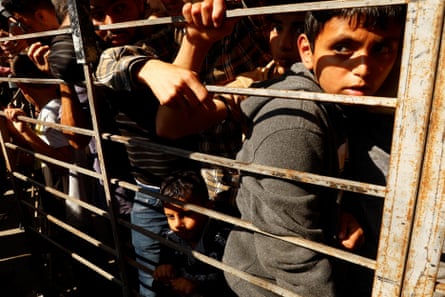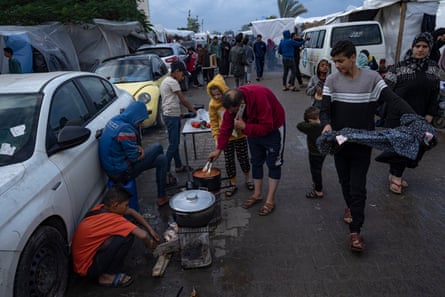Thursday 16 November
8am My dream is simple. I want to sit in one of my favourite restaurants in Gaza City, admiring the beautiful blue sea. I would order chicken pasta with lots of appetisers and a salad (you know, to stay healthy). I will be in the company of my friends, we will talk about our mundane lives, complain about our work, and discuss our favourite TV shows. I will order hot chocolate, and get surprised, like every time, when I discover how many calories it contains. When my friends leave, I will pick up my book and continue reading. All I want is a quiet day in Gaza City.
My sister is talking to a friend of hers describing how bad the situation has become in the schools and other places that people fled to. “The man was cooking at the entrance of the school while the sewage water was running next to him,” she says. “The scene, and the smell, made me want to vomit.”
These days, I always ask my friends about what they had for lunch. The options are very limited:
“We had biscuits and water.”
“We had eggplants and cucumbers.”
It does not matter to me what they ate, as long as they had something to eat. Unfortunately, not everyone is lucky enough. Some are sleeping without anything entering their stomach for the whole day. The prices are rocketing.
When we first evacuated to the third family’s house, they used to cook something different every day. Now, things are less available. The only falafel shop has closed its doors due to not having any gas tubes left. We have been regularly eating cheese and thyme sandwiches. They are delicious. The grandmother of the third family bakes every couple of days. And from time to time, I stand in line and get some saj bread. I couldn’t be more grateful.
9am Every morning, thousands of people are in the streets looking for what they need: food, medicine, blankets, heavy clothes. I saw a mother screaming at her young son in the middle of the street. It turned out that he got distracted and she had been looking for him for almost an hour.
“How would I find you if you got lost?” she screamed. Other women were calming her down.
These days we hear many stories about parents who lost their children, whether while fleeing or in public places. Most of the evacuating people are in these new areas for the first time, they may have passed by them before, or visited, but knowing the area is really difficult when most people have lost their ability to focus due to fear, stress or lack of sleep.
I remember talking to my friend who had a new baby girl months ago. “I know this will sound scary, but please, write on your daughter’s body all the identification information in marker, just in case,” I said. He was silent for a second, then he told me that he agreed with me.
I have witnessed several times the same situation, a group of boys go out to play with a ball, and the parents, usually fathers, would go out angry and tell them to get back inside.
“If a bombing happens now, what will happen to you?! Go inside, immediately.”
Not only parents are scared, but everyone is scared for their own safety. You go to buy medicine and you are not sure whether you will get back or not. You leave the place you are at and wonder whether it will get bombed or not.
10am The cats are doing well. Every day, I take Jack to the vet to give him the required injections.
Unfortunately, it is certain, Jack cannot see. But we are grateful that he is able to walk. And now, he has started eating pureed food. Also, he started recognising the litter box, sometimes he does it in there and sometimes not. We found some disposable pads to put in the box so it will be easier to clean. Jack wants to move a lot, he uses his head and legs to make sure nothing is in his way, he even tries to climb over the couches, sometimes he falls, other times it goes well.
Since she was lost, our big cat has been distressed. She wakes up several times while sleeping and starts meowing loudly. We tell her that we are here. Once she hears one of our voices, she would go back to sleep.

Manara has been “sleep-compensating” for the past two days. Only when food is served, she would wake, stand in line, politely, after the other cats, and wait her turn. She always gives us a grateful look. She eats and goes back to sleep. Her wounds are healing, and no lumps are coming out of her damaged eye any more.
The small cat is the craziest. When I sleep for a couple of minutes, I wake to her tail covering my nose, or her big eyes looking directly into mine. She has developed what I call the “sleeping trust position” – she sleeps in a way that, if you make any move, she would fall, so you have to stay still for a long time to keep her safe. If you move, even for an inch, she would be annoyed.
I believe that their presence is distracting us from a lot of the negative feelings we might have if they hadn’t been there.
4pm Everyone is fighting. People are fighting over water, bread and over nothing. The level of anxiety is reaching its peak.
My sister’s friend calls her, crying. He is with his wife and two children at his brother’s house.
He tells her that his brother’s wife is controlling everything: what they eat, how much they eat and when they can use the toilet. “It is humiliating. She would control the breath we take if she could. But we have no other option. We have to tolerate her.”
6pm There is nothing hopeful. Nobody knows anything. There are many friends that we are not sure if they are safe or not, or alive or dead. The communication is bad; many places have no internet connection, and uncertainty is high.
“How are you?” is becoming the most difficult question. We don’t know how we are any more. We are not sure how we feel. And to add salt to the wound, our loved ones who are abroad ask questions like, “What is the solution to this whole situation?”
We would be like: “Really?! The whole world is unable to solve this situation and you think we know the answer?!”
10pm When you get into the shower, and you feel cold, appreciate that first drop of hot water over your body.
When you are about to eat a meal, look at the plates, give yourself time to let the beautiful smells of the food in, admire what you have, the variety of colours. And the taste.
When you are in your house, hug the walls. Yes, hug the walls. Be grateful to have a roof over your head.
Because, even though these details are minor, yet for many, they are a dream. Believe me, if you have a good meal, access to basic needs, and a normal mundane routine, you own the whole world.

